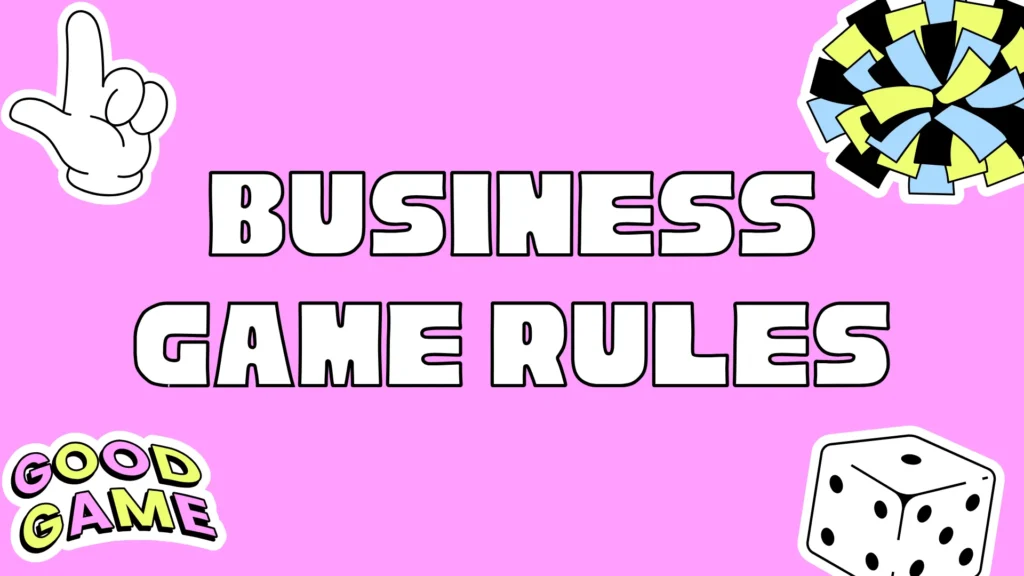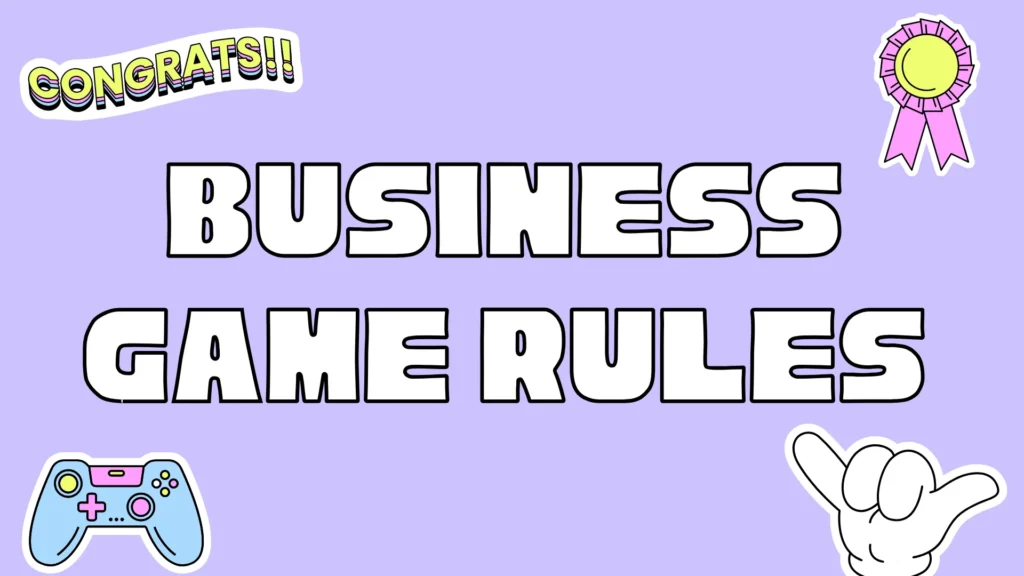In business games, players learn economics, strategy, and negotiation in dynamic simulation games. Business game rules make gameplay better, with various options for family play, digital play, and corporate training. From real estate purchase, to rent mining and top-level strategies, those games are backed up by educational & entertainment purposes. Knowledge of business game rules develops decision-making ability, financial literacy, and team spirit in all ages and professions.
Key Insights:
- Knowing the rules of the business game enhances decision-making skill and strategy.
- Both traditional and contemporary business games are designed to have a high-scope simulation with gameplay.
- Family play and parent-activity are much more successful when game rules are understood.
Why Business Game Rules Matter
But business games are more than just board games; they are simulations of real-world economics, of decision making, of negotiation. Whether developed to be played for entertainment or for the sake of learning, business game rules can raise your game to completely new levels from the viewpoint of enjoyment and strategic planning.
This guide presents the fundamentals, advanced tactics, and even deviations from standard business game rules that ensure a fair and interesting game every time.
What Are Business Game Rules?
A business game is a game, board, or digital that deals with financial and property transactions. The best known example is the game of Business (an iteration of Monopoly) by which players buy, sell, trade, and play rent from properties, and manage cash flow.
These games aim to:
- Improve critical thinking
- Enhance negotiation tactics
- Teach economic literacy
- Foster teamwork and decision-making
Objective of Business Games Rules

The objective is to be the last player remaining with any money or property. This means purchasing property, collecting rent, investing, and escaping bankruptcy. Knowing the rules of the game of business is to make sure every move makes sense in light of these goals.
Standard Equipment in a Rules of Business Game
Business games usually have some or all of the following: a board, dice, money, property, and tokens. You need to understand these parts for play, as it has a function to play when executing rules and transactions, and the pace of play speed.
In order to understand how to play the Business game, get to know the usual suspects:
- Game Boards with city properties
- Currency notes of different denominations
- Dice (usually 2)
- The playing pieces (car, airplane, etc.)
- Property cards
- Houses and hotels (for upgrades)
- Chance or community cards (optional)
- Banker (Player or third party who manages money)
Business Game Rules: Basic Gameplay Structure
At its core is a procedure of choosing tokens, rolling a die, purchasing titles, paying for a stay, and improving by building. These basic business game rules help to keep games fair, balanced, and fiercely competitive. Getting the flow down pat, from beginning to end, results in smoother running sessions with conflict and depth.
Let’s simplify the business game rules down into a few stages, here:
1. Starting the Game
- Each player chooses a token.
- The banker hands out the starting money, usually ₹15,000 ($1,500).
- Game Play Players roll: The highest starts.
- Movement follows a clockwise direction.
2. Rolling the Dice
- Players roll a pair of dice and move their piece to an appropriate space.
- When landing on a property, players can also buy that property if it is not already owned.
- If purchased, rent is paid to the owner as specified on the deed card.
3. Buying and Trading Properties
- When you land on an unowned property, you can buy it.
- If you decline to buy, it is sold at auction (optional rule).
- Transactions of properties between players can be done for cash or goods.
4. Paying Rent
- Rent is charged when you land on someone else’s property.
- Rents go up with the development of properties (houses/hotels).
5. Building on Properties
- After you buy all of the properties within a color group, you can then build.
- Each upgrade raises the rent value.
- Pay the banker for buildings.
6. Chance and Community Cards
- Draw when landing on certain board spaces.
- They can reward you or penalize you (such as “Go to Jail” or “Win Lottery”).
7. Jail Rules
- You can get out by:
- Paying a fine
- Playing the “Get Out of Jail Free” card
- Rolling doubles in 3 turns
8. Bankruptcy
- If he has to pay rent/fine and can’t afford it, he may mortgage/sell.
- If he still remains unable to pay his debts, he is a ruined player.
Also Read – Crypto Scams 2025: How to Spot, Avoid & Protect Yourself
Advanced Business Games Rules: Strategic Play

The advanced rules bring in more advanced strategy with things like cornering certain properties, managing your cash flow, and doing deals. These business game rules transcend the rudimentary and reward the prescient, the adaptable, and the risk-averse. Learners who get these subtleties usually have an upper hand, hence making the game competitive and intellectually stimulating.
If you want to stand out, however, you’ll want to go beyond the basics:
- Stay Away From Little Houses For Limited Returns. Stay away from houses that won’t generate a lot of return early on.
- This will get you more sets of full color to build quickly.
- Trade clever to own it all.
- Try to have an emergency fund to access liquidity to pay for surprises.
- Seize control of the mid-price zones or get ROI quickly.
Learning the intricacies of business game rules helps get control over the game with strategic thinking.
Variations in Business Game Rules
Home editions or digital versions typically tweak the rules of the business game, inserting jackpots, speed dice, and auctions. These modifications bring new opportunities and challenges that need flexible methodologies. Knowing a variety of alternatives adds to flexibility, as well as keeping the game familiar and custom-made for group preference.
Variations of business game rules can be found in various editions or in user-created versions made by individuals:
| Variant | Rule Difference |
| Speed Die | The third die accelerates the game |
| Free Parking Jackpot | Collect fines on Free Parking |
| Auction Rule | All unbought properties go to auction |
| Custom Rules | Players decide the rules before the game starts |
Modify your tactics to cater to these differences.
Digital Business Games Rules: Do the Rules Ever Change?
Digital versions, like Business Game 3D, or apps derived from Monopoly, keep core rules but automate banking, dice rolling, and rent collection. But manual understanding of business game rules contributes to critical decision-making.
Educational Benefits of Business Games: Rules
But as fun as they are, business games provide real-life lessons, among them the essentials of money: budgeting, negotiation, strategic planning, and economic literacy. These games are designed to mimic financial situations, so players can learn critical business lessons, particularly students. Following the rules of business games boosts logical thinking and taking profitable decisions under pressure.
- How to Be Financially Literate: Know cash flow, ROI, and the burden of debt.
- The Art Of Negotiation: Cut deals under pressure.
- Time Management: Develop the ability to be patient and to plan long-term.
- Risk Planning: Look at the upside and downside.
Business Games Rules for Kids
Typical business game rules for children are guided play, less number of financial transactions, and visualizations. These changes provide for understanding yet keep intact the essence of how to earn, spend, and plan. Playing with a modified ruleset helps children learn the basics of math, fairness, and strategic thinking.
- Easy banking (parent or app support).
- Use toy money or tokens.
- Explain the rules with examples.
- Allow only one building and one trade per turn.
- Play shorter sessions.
These changes help the younger ones play and learn at the same time.
Business Games Rules for Friends & Family
Our house has rules and a time limit in place that ‘fixates’ business games in a social environment. These business game rules are frequently tailored to create more collegiality, less contention, and greater access for all competencies. Playing with friends and family promotes discussion, competition, and group consensus.
- House rules should be agreed upon before beginning.
- Good play time: Limit (e.g., 90 minutes).
- Create penalties for aggressive trades.
- Encourage learning, not just winning.
Playing the way you play business games makes healthy competition and player bonding inevitable.
Business Games Rules for Corporate Training

In industry, business games can be used to model decision-making processes, teamwork, and the market environment. Custom business game rules introduce employees to strategic planning, budgeting, and leadership. This game-based learning enables professionals to improve business acumen and develop teamwork and problem-solving techniques within a competitive, simulated market environment.
Business games are currently applied in the HR and training field:
- Simulate market dynamics and decision-making
- Designate roles: CFO, Sales, Marketing Quarterback, etc.
- Reflect real-world business outcomes
By knowing the business game rules, participants may extrapolate gaming experiences to the real world.
Conclusion
Business games are not just entertainment they are learning platforms in the form of fun. Mastering the rules of a business game exposes you to economics, risk, and strategy. Played in the home, at school, or in the office, you will learn something that you can apply as a positive attribute to every area of your life.
The more clearly you see the rules of the business games, the more ready you are to win not only the games, but also in life.
FAQs
What is the primary objective of business games?
To become the richest player through real estate, shares, and deals.
What is the banker’s role?
The banker is responsible for handling cash flow, loans, and properties not yet purchased.
Am I able to sell houses to the other players?
Yes, if the trade is endorsed by both sides.
What if I end up in jail?
You miss a few turns unless you pay the fine or play a special card.
Do business games have global rules?
Fundamental rules are the same, but regional editions might have variations.
Curved Vs Straight Rules: What’s The Difference?
As far as strategies go, bent (flexible) rules adopt house rules; whereas straight rules play it by the book.
What is the typical length of time for a business game?
About 60 to 120 minutes, depending on players and house rules.




